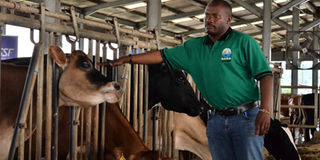Prime
Farm Clinic brings dairy farming to the classroom

Dr Robert Mwesigwa, a nutritionist at NaLIRRI explains the role of breeds in obtaining desired levels of butterfat content. Other factors include proper nutrition and animal welfare. Photos / George Katongole
What you need to know:
- During a training session, Dr Mwesigwa a dairy expert at NaLIRRI explained that mastitis reduces milk yields while increasing the cost of production yet making milk less valuable for consumption and food manufacturing
In a tough dairy market, with growing volatility and uncertainty, the 25th edition of the Seeds of Gold Farm Clinic at NaLIRRI in Namulonge was designed to help farmers to make the business more resilient and profitable.
The event filmed at the state-of-the-art cow shade is the starting point for lowering costs of production, optimising nutrition, reducing reliance on antibiotics and improving cow health.
The virtual clinic concept was started last year as an alternative to the physical tours where farmers could congregate at a selected Naro institute to learn about the modern trends in farming and livestock.
But since the outbreak of Covid-19, Nation Media Group – Uganda opted for virtual farm clinics that are filmed on location.
The objective is to connect farmers with the researchers showing them how to adopt climate-smart farming practices and why it is important to use improved seeds and livestock breeds.
Last week, Dr Moses Mwesigwa, a dairy expert at the institute would try to use farm experiences as examples to give farmers a different perspective.
Embryo transfer
When Dr Mwesigwa taught at NaLIRRI, he announced the institute’s giant steps towards an efficient breeding technology of embryo transfer (ET) in cattle. Although this technology has been used worldwide for years, it is a novel practice in Uganda by scientists at Namulonge. Most farmers have been used to Artificial Insemination (AI).
But Dr Mwesigwa explained that the institute is working with more than 60 farmers so far on spreading the transferable embryos technology.
“We need to be more efficient in fertilising dairy cows and embryo transfer of what we look at as an efficient alternatives,” Dr Mwesigwa said.

NTV’s Moses Kyamagero interacts with Dr Moses Mwesigwa during the Seeds of Gold Farm Clinic at Namulonge.
Milking more
The experts also discussed dairy products such as cheese and yoghurt. But Dr Mwesigwa added that dairy farming should not be looked at as an end itself but part of the value chain.
“You can ably run a dairy farm while buying grass from other farmers and utilizing cow dung to earn more money,” Dr Mwesigwa said.
Apart from the breed, which largely determines the profitability of dairy farming, Dr Mwesigwa took keen farmers on a trip of making dairy cattle farming profitable encouraging farmers to be passionate about the business while putting emphasis on proper nutrition and health.
Animal health
Experts from Zoetis, also outlined the health challenges that face dairy farmers. Zoetis is a leading animal health company, which develops and manufactures veterinary vaccines and medicines, as well as diagnostic products, genetic tests and bio devices.
Dr Mwesigwa stressed the challenge of mastitis in milking cows as well as diarrhoea in calves. He explained that mastitis reduces milk yields while increasing the cost of production yet making milk less valuable for consumption and food manufacturing. Yet diarrhoea can be a major cause of poor growth and calf mortality.
The Seeds of Gold Farm Clinic is brought to you by the Nation Media Group in partnership with the National Agricultural Research Organisation (Naro). The programme is sponsored by Bank of Uganda, Stanbic Bank, the National Social Security Fund (NSSF) and Zoetis.
The final leg of the Seeds of Gold Farm Clinic this year will be held in Mayuge on December 4 where farmers will be taught about cassava, maize, pastures, coffee and rice farming.




